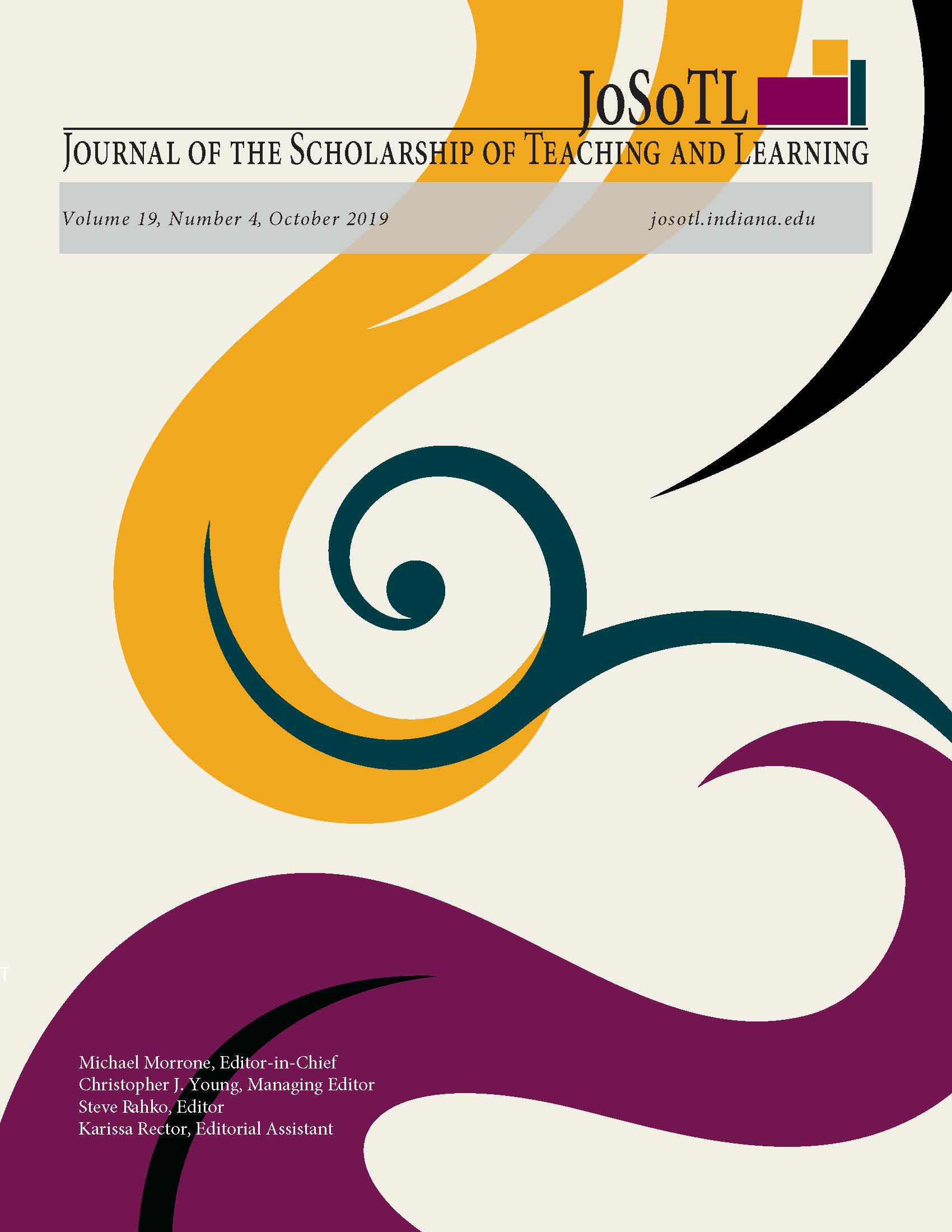Faculty Beliefs about the Nature of Intelligence
Main Article Content
Abstract
Educators shape the learning experiences of students in the classroom. Their views on intelligence influence the beliefs students have about their own abilities to learn. Astin (2016) cautioned, "The faculty culture regards smartness in an almost reverential fashion" (p. 4). Research on academic mindsets has focused mainly on secondary education (e.g., Dweck, 2016; Yeager & Dweck, 2012). There is a gap in the literature about educator views about intelligence in higher education. The purpose of this study was to measure the beliefs that faculty from various academic disciplines hold about the nature of their own intelligence and the intelligence of their students. Faculty at one land grant institution participated in an eight-term Mindset survey. Position was the only statistically significant demographic factor.
Downloads
Article Details
- Authors retain copyright and grant the Journal of the Scholarship of Teaching and Learning (JoSoTL) right of first publication with the work simultaneously licensed under a Creative Commons Attribution License, (CC-BY) 4.0 International, allowing others to share the work with proper acknowledgement and citation of the work's authorship and initial publication in the Journal of the Scholarship of Teaching and Learning.
- Authors are able to enter separate, additional contractual agreements for the non-exclusive distribution of the journal's published version of the work (e.g., post it to an institutional repository or publish it in a book), with an acknowledgement of its initial publication in the Journal of the Scholarship of Teaching and Learning.
- In pursuit of manuscripts of the highest quality, multiple opportunities for mentoring, and greater reach and citation of JoSoTL publications, JoSoTL encourages authors to share their drafts to seek feedback from relevant communities unless the manuscript is already under review or in the publication queue after being accepted. In other words, to be eligible for publication in JoSoTL, manuscripts should not be shared publicly (e.g., online), while under review (after being initially submitted, or after being revised and resubmitted for reconsideration), or upon notice of acceptance and before publication. Once published, authors are strongly encouraged to share the published version widely, with an acknowledgement of its initial publication in the Journal of the Scholarship of Teaching and Learning.
References
Aronson, J., Fried, C.B., & Good, C. (2002). Reducing the effects of stereotype threat on African American college students by shaping theories of intelligence. Journal of Experimental Social Psychology, 38, 113-125.
Association for Institutional Research. (2017). Common data set. Retrieved from http://www.commondataset.org/
Astin, A.W. (1984). Student involvement: A developmental theory for higher education. Journal of College Student Personnel, 25(4), 297-308.
Astin, A.W. (2016). Are you smart enough? How colleges’ obsession with smartness shortchanges students. Sterling, VA: Stylus.
Blackwell, L.S., Trzeniewski, K.H., & Dweck, C.S. (2007). Implicit theories of intelligence predict achievement across an adolescent transition: A longitudinal study and an intervention. Child Development, 78, 246-263.
Blair, R., Tolman, A.O., Kremling, J., & Morris, T. (2016). How promoting student metacognition can reduce resistance. In A.O. Tolman & J. Kremling (Eds.), Why students resist learning: A practical model for understanding and helping students (pp. 165-188). Sterling, VA: Stylus.
Chickering, A.W., & Reisser, L. (1993). Education and identity. San Francisco, CA: Jossey-Bass.
Dweck, C.S. (1999). Self-theories: Their role in motivation, personality, and development. Philadelphia, PA: Psychology Press.
Dweck, C.S. (2006). Mindset: The new psychology of success. New York: Random House.
Dweck, C.S. (2015, September 22). Carol Dweck revisits the ‘growth mindset.’ Education Week. Retrieved from https://www.edweek.org/ew/articles/2015/09/23/carol-dweckrevisits-the-growth-mindset.html
Dweck, C. S. (2016, January 13). What having a “growth mindset” actually means. Harvard Business Review, 13. Retrieved from http://thebusinessleadership.academy/wpcontent/uploads/2017/03/What-Having-a-Growth-Mindset-Means.pdf
Fosnacht, K., Sarraf, S., Howe, E., & Peck, L.K. (2017). How important are high response rates for college surveys? The Review of Higher Education, 40(2), 245-265.
Gross-Loh, C. (2016, December 16). How praise became a consolation prize. The Atlantic. Retrieved from https://www.theatlantic.com/education/archive/2016/12/how-praisebecame-a-consolation-prize/510845/
Krumboltz, J. D. (2009). The happenstance learning theory. Journal of Career Assessment, 17(2), 135-154.
Leon, A.C., Davis, L.L., & Kraemer, H.C. (2011). The role and interpretation of pilot studies in clinical research. Journal of Psychiatric Research, 45, 626-629.
Leslie, S. J., Cimpian, A., Meyer, M., & Freeland, E. (2015). Expectations of brilliance underlie gender distributions across academic disciplines. Science, 347(6219), 262-265.
McGuire, S.Y., & McGuire, S. (2015). Teach students how to learn: Strategies you can incorporate into any course to improve student metacognition, study skills, and motivation. Sterling, VA: Stylus.
Office of Planning & Analysis. (2018). Fiscal year faculty and staff headcounts. Manhattan, KS: Kansas State University.
Raosoft. (2017). Sample size calculator. Retrieved from http://www.raosoft.com/samplesize.html
Rattan, A., Savani, K., Naidu, N., & Dweck, C. S. (2012). Can everyone become highly intelligent? Cultural differences in and societal consequences of beliefs about the universal potential for intelligence. Journal of Personality and Social Psychology, 103(5), 787-803.
Robins, R. W., & Pals, J. L. (2002). Implicit self-theories in the academic domain: Implications for goal orientation, attributions, affect, and self-esteem change. Self and Identity, 1(4), 313-336.
Rosenthal, R., & Jacobson, L. (1968). Pygmalion in the classroom. The Urban Review, 3(1), 16-20.
Rubie-Davies, C., Hattie, J., & Hamilton, R. (2006). Expecting the best for students: Teacher expectations and academic outcomes. British Journal of Educational Psychology, 76(3), 429-444.
Selingo, J.J. (2018, June 11). Too many kids are dropping out of college — here’s how to fix it. New York Post. Retrieved from https://utex.as/2JQ1a04
Shively, R. L., & Ryan, C. S. (2013). Longitudinal changes in college math students’ implicit theories of intelligence. Social Psychology of Education, 16(2), 241-256.
Tinto, V. (2012). Completing college: Rethinking institutional action. Chicago, IL: University of Chicago Press.
Vallerand, R.J., Pelletier, L.G., Blais, M.R., Briere, N.M., Senecal, C., & Vallieres, E.F. (1992). The Academic motivation scale: A measure of intrinsic, extrinsic, and amotivation in education. Educational and Psychological Measurement, 52(4), 1003-1017.
Yeager, D.S., & Dweck, C.S. (2012). Mindsets that promote resilience: When students believe that personal characteristics can be developed. Educational Psychologist, 47(4), 302-314.
